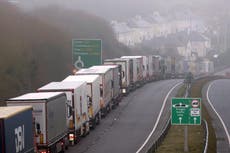Can Jacob Rees-Mogg rip up enough EU rules to keep Brexiteers happy?
The minister for Brexit opportunities is under pressure to come up with some clear wins. Adam Forrest takes a look at how much deregulation is possible


Jacob Rees-Mogg has made a noisy start to his new job as minister for Brexit opportunities, waving around some headline-winning claims about Brexit proving to be a big “success” and “extremely beneficial”.
But his new role – cutting red tape in a way keeps Brexiteers happy – will be much more demanding than his previous duties keeping the antiquated business of the Commons in order.
“My role is to try and cut through this thicket. My role as the Brexit opportunities minister is to find out where regulations exist that we don’t need, and to try and get rid of them,” he says.
So how exactly is Rees-Mogg going to keep busy? Which pesky regulations are waiting to be axed? And why the fresh row over EU rules, two years on from Britain’s exit from the bloc?
Well, Tory Brexiteers are on the warpath. Again. Sir Iain Duncan Smith says the government have “done absolutely sweet FA” to take advantage of Brexit and advance the cause of economic deregulation.
The former Tory leader – who led a taskforce which proposed around 100 measures to cut excessive red tape last year – has told The Telegraph that time is running out to keep Leave-backing voters sweet.
Sir Iain thinks Rees-Mogg and fellow ministers will have to introduce significant changes in the next “nine months” so they can bed in the next election in 2023 or 2024. “At that stage, what are you going to show?”
The government is hoping the proposed Brexit Freedoms Bill, which will make it easier to amend existing EU laws on the UK statute book, will keep Sir Iain and others happy.
The bill will remove any unwanted “retained law” using backstage regulations, instead of full votes in the Commons.
This has sparked fears by campaigners and opposition parties that a “bonfire” of regulations on everything from data privacy to road standards will be forced through without close scrutiny by MPs.
Would some quick and relatively minor changes on data privacy and road standards keep impatient Brexiteers happy? Probably not.
Sir Iain has called for a major rewriting of continuing EU financial rules – so-called Solvency II – to create another investment boom in the City of London.
Some changes are likely. Chancellor Rishi Sunak has met with dozens of financial firms and banking lobby groups about post-Brexit rules last year, The Independent recently revealed.
But Sir Iain says the Treasury still doesn’t “agree” with him about the desired level of deregulation – fearing it will fall far short of the “big bang” brought in by Margaret Thatcher’s government in the mid-1980s.
So the hard-line backbenchers and the wheeler-dealer Brexit-backers of the business world will surely find cause for complaint. They always do. Reality has a nasty habit of ruining fantasies; in this case, the dream of a deregulated, free-market paradise.
What about the voters? Rees-Mogg hopes he will be able to talk up the tearing of EU rules in the months ahead. But it’s hard to imagine voters getting too excited about complicated regulatory changes – not while fuel bills rise and prices at the supermarket soar.
The irony about Rees-Mogg’s war on red tape is the deluge of extra paperwork brought on by Brexit. Businesses are drowning in customs forms and rules of origin declarations – and more detailed checks on agri-food products are on the way in July.
The minister’s comments at the weekend – on the unnecessary inspection of tuna shipments from Thailand – suggests he does not quite understand the bureaucracy of border checks, and the added burden leaving the EU’s single market and customs union now imposes.
Rees-Mogg does not get easily embarrassed. He will happily trumpet a tiny amendment to road safety as one in the eye for Brussels, and add it to the list of Brexit benefits alongside blue passports and crown stamps on pint glasses.
But come the general election campaign, when voters are asked if Brexit has benefited their lives, few will work about much enthusiasm about minor regulatory changes.
Join our commenting forum
Join thought-provoking conversations, follow other Independent readers and see their replies
Comments


Bookmark popover
Removed from bookmarks